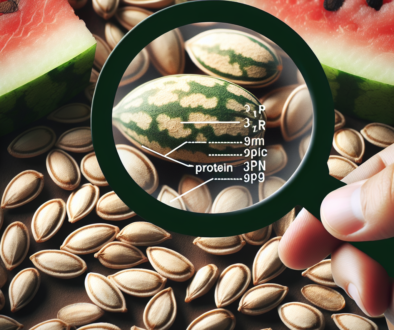Is It Ok To Eat Melon Seeds?
-
Table of Contents
- Eating Melon Seeds: Nutritional Benefits and Safety Considerations
- Nutritional Profile of Melon Seeds
- Are Melon Seeds Safe to Eat?
- Culinary Uses of Melon Seeds
- Health Benefits of Consuming Melon Seeds
- Potential Risks and Considerations
- Conclusion: Embracing Melon Seeds in Your Diet
- Discover ETprotein’s Plant-Based Protein Products
Eating Melon Seeds: Nutritional Benefits and Safety Considerations

When it comes to snacking, seeds are often touted as a healthy option. Among these, melon seeds, which come from various types of melons like watermelon, cantaloupe, and honeydew, are gaining popularity. But is it okay to eat melon seeds? This article delves into the nutritional benefits, safety considerations, and culinary uses of melon seeds, providing a comprehensive guide for those looking to incorporate these seeds into their diet.
Nutritional Profile of Melon Seeds
Melon seeds are not just a crunchy snack; they are packed with nutrients that can offer various health benefits. Here’s a breakdown of what these seeds contain:
- Protein: Melon seeds are a good source of plant-based protein, which is essential for muscle repair and growth.
- Fiber: The high fiber content in melon seeds can aid in digestion and promote a feeling of fullness, which is beneficial for weight management.
- Vitamins: These seeds are rich in vitamins, particularly B vitamins like folate, which is crucial for DNA synthesis and preventing neural tube defects during pregnancy.
- Minerals: Melon seeds contain important minerals such as magnesium, potassium, and zinc, which support various bodily functions including immune response and nerve function.
- Healthy Fats: They are a good source of unsaturated fats, including omega-3 and omega-6 fatty acids, which are important for heart health.
- Antioxidants: Melon seeds have antioxidant properties that can help combat oxidative stress and reduce the risk of chronic diseases.
Are Melon Seeds Safe to Eat?
Yes, melon seeds are generally safe to eat. However, there are a few considerations to keep in mind:
- Preparation: Raw melon seeds can be hard to digest, so it’s recommended to roast or sprout them before consumption.
- Choking Hazard: Small children should avoid eating melon seeds due to the risk of choking.
- Allergies: Some individuals may be allergic to melon seeds. If you experience any adverse reactions, discontinue use and consult a healthcare professional.
Culinary Uses of Melon Seeds
Melon seeds can be used in a variety of culinary applications:
- Snacking: Roasted melon seeds make a nutritious and satisfying snack on their own.
- Garnishing: Sprinkle them over salads, yogurts, or soups for added crunch and nutrients.
- Baking: Incorporate melon seeds into bread, muffins, or energy bars for a protein boost.
- Blending: Ground melon seeds can be added to smoothies or used as a base for sauces and dips.
Health Benefits of Consuming Melon Seeds
Eating melon seeds can contribute to overall health in several ways:
- Heart Health: The unsaturated fats in melon seeds can help lower bad cholesterol levels and reduce the risk of heart disease.
- Weight Management: The fiber content in melon seeds can help control appetite and support weight loss efforts.
- Blood Sugar Control: The combination of protein, fiber, and healthy fats can help stabilize blood sugar levels, which is beneficial for those with diabetes.
- Bone Health: Minerals like magnesium and zinc in melon seeds are important for maintaining strong bones.
- Immune Support: Nutrients in melon seeds, such as zinc and antioxidants, can help bolster the immune system.
Potential Risks and Considerations
While melon seeds are generally healthy, there are some potential risks to consider:
- Caloric Density: Melon seeds are calorie-dense, so it’s important to consume them in moderation, especially if you’re watching your calorie intake.
- Quality: Ensure that the melon seeds you consume are free from contaminants and pesticides by choosing organic options when possible.
- Hydration: Due to their high fiber content, it’s important to drink plenty of water when consuming melon seeds to avoid digestive issues.
Conclusion: Embracing Melon Seeds in Your Diet
In conclusion, melon seeds are a nutritious and versatile food that can be safely consumed when prepared properly. They offer a wealth of health benefits, from supporting heart health to aiding in weight management. By incorporating melon seeds into your diet, you can enjoy their crunchy texture and nutritional advantages while exploring new culinary possibilities.
Discover ETprotein’s Plant-Based Protein Products
If you’re interested in exploring plant-based protein options, ETprotein offers a range of high-quality protein products, including watermelon seed protein. Their products are organic, non-GMO, and allergen-free, making them a great addition to any health-conscious diet. Whether you’re looking for ingredients for sports nutrition, weight management, or general wellness, ETprotein has you covered. To learn more about their offerings or to request a sample, contact ETprotein today.
About ETprotein:
ETprotein, a reputable protein and L-(+)-Ergothioneine (EGT) Chinese factory manufacturer and supplier, is renowned for producing, stocking, exporting, and delivering the highest quality organic bulk vegan proteins and L-(+)-Ergothioneine. They include Organic rice protein, clear rice protein, pea protein, clear pea protein, watermelon seed protein, pumpkin seed protein, sunflower seed protein, mung bean protein, peanut protein, and L-(+)-Ergothioneine EGT Pharmaceutical grade, L-(+)-Ergothioneine EGT food grade, L-(+)-Ergothioneine EGT cosmetic grade, L-(+)-Ergothioneine EGT reference grade and L-(+)-Ergothioneine EGT standard. Their offerings, characterized by a neutral taste, non-GMO, allergen-free attributes, with L-(+)-Ergothioneine purity over 98%, 99%, cater to a diverse range of industries. They serve nutraceutical, pharmaceutical, cosmeceutical, veterinary, as well as food and beverage finished product distributors, traders, and manufacturers across Europe, USA, Canada, Australia, Thailand, Japan, Korea, Brazil, and Chile, among others.
ETprotein specialization includes exporting and delivering tailor-made protein powder and finished nutritional supplements. Their extensive product range covers sectors like Food and Beverage, Sports Nutrition, Weight Management, Dietary Supplements, Health and Wellness Products, and Infant Formula, ensuring comprehensive solutions to meet all your protein needs.
As a trusted company by leading global food and beverage brands and Fortune 500 companies, ETprotein reinforces China’s reputation in the global arena. For more information or to sample their products, please contact them and email sales(at)ETprotein.com today.












